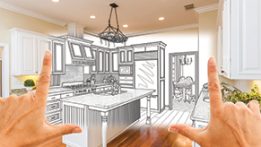Your kitchen is a room that you want to feel complete and personal to you. Your kitchen backsplash ties the entire room together and is customizable to you and your home. Choosing the right backsplash is crucial when putting the final touches on any kitchen design or renovations, so it is important to know the pros and cons of common backsplash materials. Among the most popular backsplash materials is tile, a lightweight and easy-to-clean material that has a lot of diversity when it comes to design. Here are some aspects about different types of backsplash tile to consider.
Ceramic Tile
 Ceramic tile, one of the most popular materials, is lightweight, cost effective, and easy to install. It has a lot of diversity and comes in various shapes and sizes as well as patterns and colors. This allows for flexibility within your kitchen. The price of ceramic tile can range from around a dollar per square foot for glossy or glazed ceramic to whatever price you are willing to spend for a more high-end, hand-made version of ceramic tile. The durability of ceramic also makes it very appealing, as it can stand up well against water and other kitchen elements.
Ceramic tile, one of the most popular materials, is lightweight, cost effective, and easy to install. It has a lot of diversity and comes in various shapes and sizes as well as patterns and colors. This allows for flexibility within your kitchen. The price of ceramic tile can range from around a dollar per square foot for glossy or glazed ceramic to whatever price you are willing to spend for a more high-end, hand-made version of ceramic tile. The durability of ceramic also makes it very appealing, as it can stand up well against water and other kitchen elements.
Despite this being such a versatile material, there are a few downsides that come along with it. If your main concern with your kitchen backsplash is aesthetic and attractiveness, ceramic can have difficulties providing the same high-end aesthetics that other materials like granite or quartz can provide. It can also be difficult to clean depending on the size of your tile. Smaller tiles are prone to collect more dirt and grime due to the fact that they have more grout, which can be harder to clean. This may cause these tiles to stain over time.
Glass Tile
 Another popular material amongst kitchen backsplash is glass tile. Glass is a strong material that will not fade over time, and it comes in many different sizes, shapes, and colors. A huge reason why people gravitate towards glass tile is because it reflects light, which significantly opens up your kitchen to make it seem more spacious. Because of its versatility, it complements most countertop materials. This gives you a lot of creative flexibility while designing your kitchen. Glass is an environmentally friendly material, and it is very easy to clean and care for in your normal cleaning routine.
Another popular material amongst kitchen backsplash is glass tile. Glass is a strong material that will not fade over time, and it comes in many different sizes, shapes, and colors. A huge reason why people gravitate towards glass tile is because it reflects light, which significantly opens up your kitchen to make it seem more spacious. Because of its versatility, it complements most countertop materials. This gives you a lot of creative flexibility while designing your kitchen. Glass is an environmentally friendly material, and it is very easy to clean and care for in your normal cleaning routine.
However, glass tile comes with its own specific set of challenges. Because glass is a clear material, it is harder to install and flaws can be much more obvious. Your wall will require a thorough cleaning before installation to ensure that no dirt or stains can be seen through the tile. Glass does not typically require sealing, but the grout will need to be sealed in order to avoid any dirt build up or staining. Since this material can be difficult to install, it is recommended to hire a professional to do the installation for you. Other cons of this material are that it cannot be repaired, so any damaged tiles must be replaced, which can be costly. Glass also reflects sound more than other materials, which can be an inconvenience in your kitchen.
Stone Tile
Stone is a diverse material that comes in many different designs. Popular stone backsplash materials include granite, marble, travertine, and engineered stone materials, such as quartz. Stone materials are most attractive for their durability and the visual aesthetic they add to your kitchen. These materials can be costly, but they will ultimately add resale value to your home if you are committed to their upkeep.
- Granite
 Granite, the most popular stone tile material, is very strong and durable, able to last in your kitchen for years. It is very stylish and complements most countertop materials. Granite is relatively inexpensive compared to heavier stones, and it is easy to clean and maintain. There are not many cons for a granite backsplash, but some complaints include that it can get expensive if your kitchen requires a lot of material. It also can sometimes be prone to staining if not cared for properly, and regular sealing may be required. If you are committed to the upkeep of your backsplash material, granite would be a great option for your kitchen backsplash.
Granite, the most popular stone tile material, is very strong and durable, able to last in your kitchen for years. It is very stylish and complements most countertop materials. Granite is relatively inexpensive compared to heavier stones, and it is easy to clean and maintain. There are not many cons for a granite backsplash, but some complaints include that it can get expensive if your kitchen requires a lot of material. It also can sometimes be prone to staining if not cared for properly, and regular sealing may be required. If you are committed to the upkeep of your backsplash material, granite would be a great option for your kitchen backsplash. - Marble
 Marble is another common material used for backsplashes. Like granite, marble is a visually appealing material that will add a luxurious and bright look to your kitchen. It is increasingly durable, easy to clean, and often stain-resistant. However, this material requires regular upkeep and cleaning in order to keep it looking fresh. It also will need to be sealed regularly to increase its lifespan. Regular cleaning and maintenance will make marble a worthwhile addition to your kitchen.
Marble is another common material used for backsplashes. Like granite, marble is a visually appealing material that will add a luxurious and bright look to your kitchen. It is increasingly durable, easy to clean, and often stain-resistant. However, this material requires regular upkeep and cleaning in order to keep it looking fresh. It also will need to be sealed regularly to increase its lifespan. Regular cleaning and maintenance will make marble a worthwhile addition to your kitchen. - Travertine
 If you are thinking about giving your kitchen a more classical look, travertine would be your ideal stone. This is a lightweight and easy to install material that gives your kitchen a historical feel. This stone comes in many different shades of brown that can be personalized to your liking. Travertine is a soft stone that comes in a variety of finishes ranging from rough and natural to fine and smooth. The stone’s softness also allows it to be cut easily, which decreases the overall cost of purchase and installation. However, this is a stone that demands care and upkeep since it is brittle and can be easily damaged. It can also be prone to water damage, so consistent sealing is necessary. This can cause the material to be difficult to clean, so it is recommended to use a vinegar-free cleaning agent and clean gently. If you are looking for a more historical look for your kitchen, travertine is perfect if you are willing to take proper care of it.
If you are thinking about giving your kitchen a more classical look, travertine would be your ideal stone. This is a lightweight and easy to install material that gives your kitchen a historical feel. This stone comes in many different shades of brown that can be personalized to your liking. Travertine is a soft stone that comes in a variety of finishes ranging from rough and natural to fine and smooth. The stone’s softness also allows it to be cut easily, which decreases the overall cost of purchase and installation. However, this is a stone that demands care and upkeep since it is brittle and can be easily damaged. It can also be prone to water damage, so consistent sealing is necessary. This can cause the material to be difficult to clean, so it is recommended to use a vinegar-free cleaning agent and clean gently. If you are looking for a more historical look for your kitchen, travertine is perfect if you are willing to take proper care of it. - Quartz
 To avoid the challenges of authentic stone materials, more people are turning to engineered stone materials, such as quartz. Because quartz is engineered, it is very customizable and can come in any size, shape, color, or pattern. It can fit into any style of kitchen whether it be a modern design or a more traditional style. It is a non-porous material that is easy to clean and is water and stain resistant. Although quartz is likely the most customizable and adaptable to your kitchen, it is accompanied by a few difficulties. The more customized and high-quality quartz can be costly, and cheaper quartz can have seams and other elements that can make it harder to maintain. This material is not like natural stone and loses some of the benefits of the more authentic materials. It can also fade in direct sunlight over time, which is something to be aware of. If you are willing to spend the money to get the exact design and material that you want, quartz and other engineered stones can be the perfect option for you.
To avoid the challenges of authentic stone materials, more people are turning to engineered stone materials, such as quartz. Because quartz is engineered, it is very customizable and can come in any size, shape, color, or pattern. It can fit into any style of kitchen whether it be a modern design or a more traditional style. It is a non-porous material that is easy to clean and is water and stain resistant. Although quartz is likely the most customizable and adaptable to your kitchen, it is accompanied by a few difficulties. The more customized and high-quality quartz can be costly, and cheaper quartz can have seams and other elements that can make it harder to maintain. This material is not like natural stone and loses some of the benefits of the more authentic materials. It can also fade in direct sunlight over time, which is something to be aware of. If you are willing to spend the money to get the exact design and material that you want, quartz and other engineered stones can be the perfect option for you.
It is important to weigh all of your options when picking out your backsplash material and see what works best for you and your kitchen. These materials can be best suited for different types of kitchens, and each of them comes with its own set of pros and cons. Do your research and consult with professionals to figure out what will be best for you. ![]()
Rylee Mehr
Home & Yard Magazine








